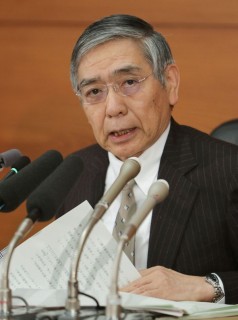Loading
Search
▼ BOJ Maintains Monetary Easing Policy, Delays Inflation Target
- Category:Other
TOKYO (Jiji Press) — The Bank of Japan maintained its massive monetary easing policy on Thursday, expressing confidence that inflation is on track to achieve its 2 percent target. The central bank’s board voted to continue applying the interest rate of minus 0.1 percent on part of current account deposits held by commercial banks.
The board concluded that it “now needs to wait and see the effects” of the negative interest rate policy introduced in February, BOJ Gov. Haruhiko Kuroda told a press conference after the bank’s two-day monetary policy meeting.
The BOJ “can expand the negative interest rate policy further if necessary,” Kuroda added.
The board also voted to continue money market operations so that the monetary base will increase at an annual pace of about ¥80 trillion.
The BOJ cut its consumer inflation forecasts in view of slowing economic activity and wage growth.
The board lowered its forecast for an annual increase in core consumer prices, which exclude volatile fresh foods, for fiscal 2016 to 0.5 percent from the 0.8 percent given in January. The estimate for fiscal 2017 was lowered to 1.7 percent from 1.8 percent.
The board also effectively pushed back its goal of achieving the inflation target.
In a report issued after the meeting, the BOJ said the timing of reaching its price stability target is “projected to be during fiscal 2017.” Previously, it said the target would be achieved around the first half of fiscal 2017.
But the report said the CPI growth rate is likely to accelerate toward 2 percent as “the underlying trend in inflation steadily rises.” Kuroda said the inflation target can be achievable.
He added that the BOJ remains committed to doing everything it can to achieve the inflation target. But he said there are no plans at present to offer loans with negative interest rates to commercial banks.
The report said the country’s economy “has continued its moderate recovery trend, although exports and production have been sluggish” due mainly to slowing growth in emerging market economies.
Referring to private consumption, the report said, “Relatively weak developments have been seen in some indicators.” Business sentiment “has become cautious, mainly reflecting the slowdown in emerging economies,” it said.
- April 30, 2016
- Comment (0)
- Trackback(0)


